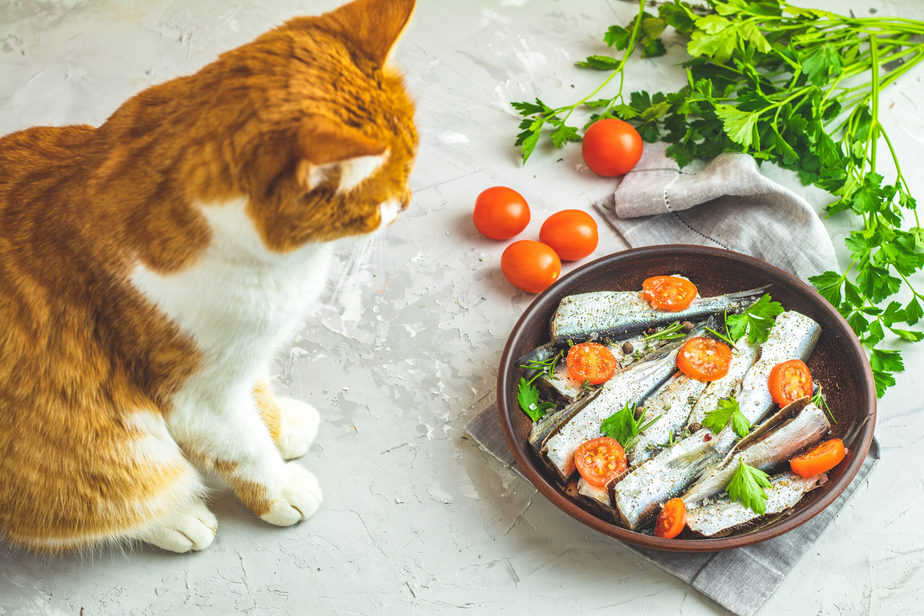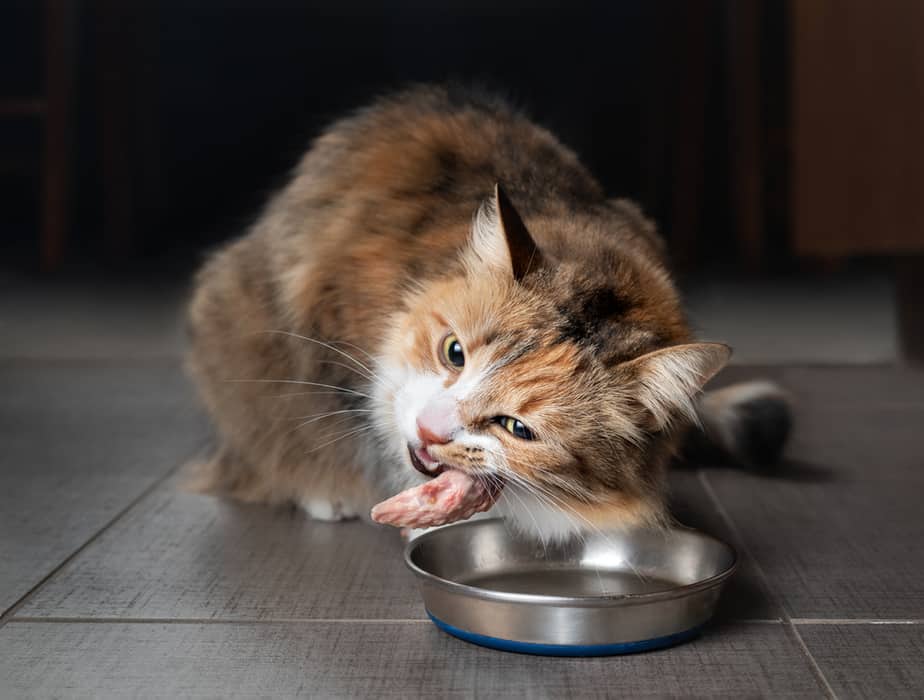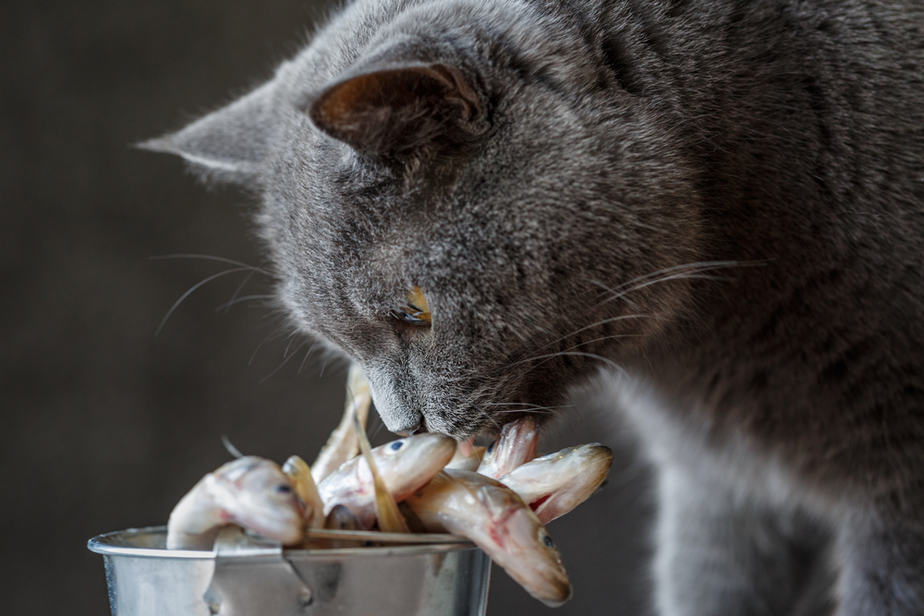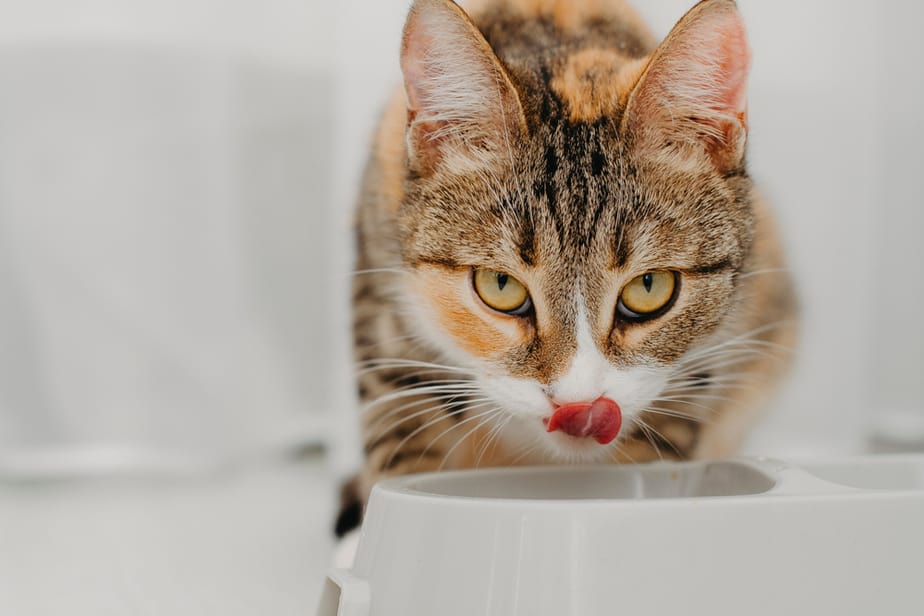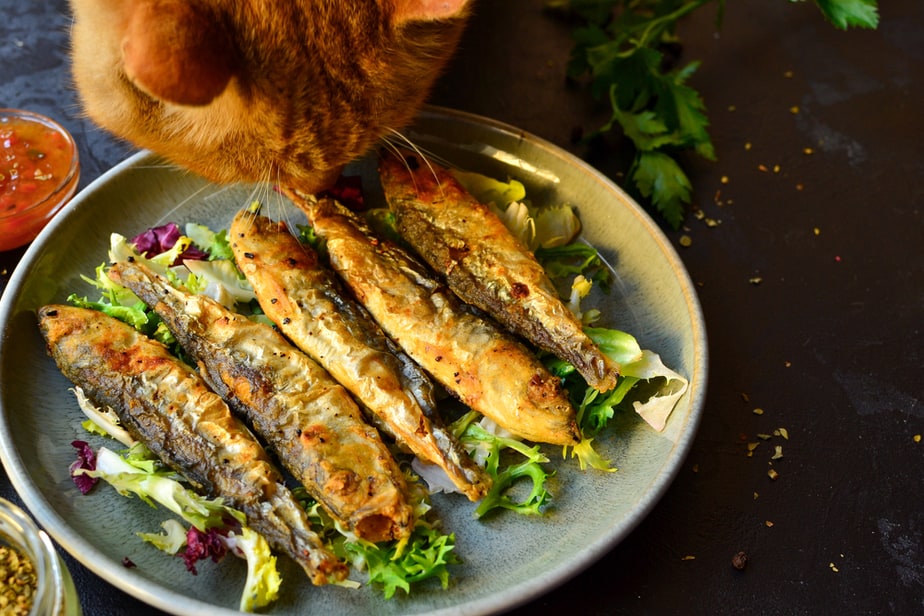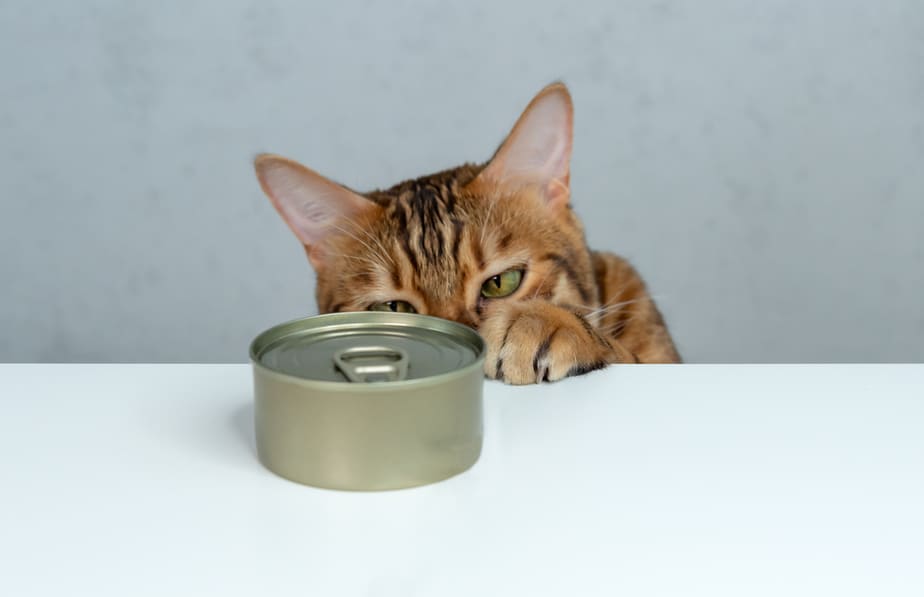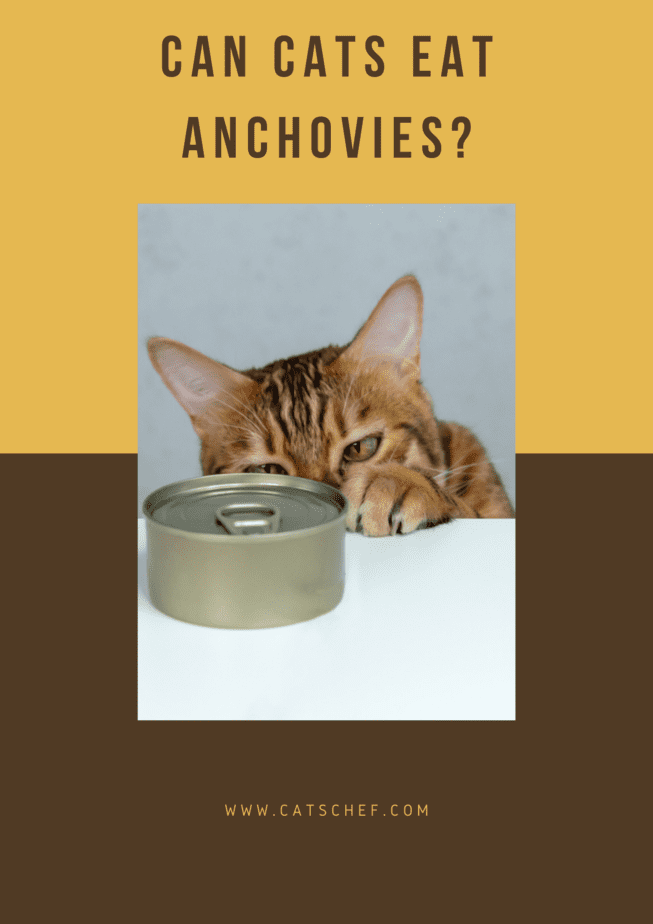📖 Table of Content:
Cats are known to be fish-lovers. But, can cats eat anchovies? These small, slender fish are safe for your pets. Not just safe, they’re a perfect way to supplement your cat’s diet.
Anchovies will supply your furchild with some great, high-value nutrients. For example, omega-3 fatty acids are found in anchovies, which act as a power-up for her immune system and heart.
So, it’s safe to say your feline can dive right into these tasty snacks. You’re probably familiar with something being too good to be true, though. So let’s see if there’s something fishy about whether cats can eat anchovies.
Anchovies: harmless or harmful?
Whether anchovies can be eaten by cats depends on how you prepare them. Your feline can benefit greatly from these fish. However, the situation can also take a turn for the worse.
Let’s see the reason behind these two possible options.
Health benefits of cats eating anchovies
Anchovies serve as a great source of nourishment for your feline. They supply a variety of dietary needs in the form of vitamins, minerals, and others.
1. Vitamins
Vitamins are an essential part of your cat’s diet. They provide her with much-needed energy. Don’t want your cat sleeping on the sofa all day, right?
For example, cats are unable to get vitamin D from sunlight like humans. Therefore, it’s important they get it through their mouth. The lack of vitamin D often leads to the loss of bone density. So, feeding your cat anchovies will help to prevent this problem.
Another important supplement is vitamin A. If your cat’s left without this important vitamin, you may want to check her eyesight.
Vitamin A deficiency will most likely manifest as night blindness. You may notice your cat having difficulties with finding her way around at night. This shouldn’t be happening as felines are naturally nocturnal animals.
If this seems to be the case, talk to your vet about adding anchovies to her regular diet. Poor sight can be dangerous for cats due to them being curious creatures.
B3, also called niacin, is what provides your cat with vitality. This vitamin helps turn food into energy. It’s the reason your feline doesn’t sleep all day long and probably why she has the energy to go crazy at 4 am.
Alongside these, a vitamin of great importance is B12. Just as is the case with vitamin D, cats lack the ability to generate B12 themselves. Hence, their main source of this valuable nutrient comes from their diet.
Vitamin B12 deficiency can reflect negatively on your feline’s health, giving rise to major issues that would cause her to feel weak, tired, or lightheaded. This vitamin can be helpful in terms of regulating your pet’s digestion and supporting a healthy nervous system.
With enough vitamin B12, your cat develops a strong immune system. This vitamin plays an important part in warding off some other diseases. Conditions such as pancreatitis, diabetes, or heart palpitations can be prevented with the intake of this nutrient.
2. Minerals
Minerals are essential if you want your feline to stay healthy. For instance, calcium is important for keeping her bones healthy. A large percentage of calcium is in bone and teeth, as well as claws. Therefore, it plays a huge part in bone strength.
Likewise, anchovies are a great source of iron. Iron is necessary for hemoglobin production, which is a part of blood cells.
Selenium is an essential trace mineral needed for muscle contraction. Selenium, as well as potassium, are important for your feline’s immune and nervous systems. Anchovies are full of these minerals and vitamins, therefore, cats can safely eat them.
If these facts aren’t enough to persuade you into feeding your cat anchovies, here’s something else. Omega-3 fatty acids found in these fish are a great energy source.
Alpha-linolenic acid (ALA), eicosapentaenoic acid (EPA), and docosahexaenoic acid (DHA) are the three main omega-3 fatty acids. These keep your feline’s health top-notch. They keep her heart, lungs, and immune system healthy.
Omega-3 fatty acids help keep your cat’s skin hydrated and are anti-inflammatory. If you’re fed up with brushing your cat daily, feed her anchovies. This won’t entirely stop your fluffball from shedding, but it will definitely help!
It will keep her shedding balanced and make her coat shine. In addition, omega-3 fatty acids will improve your cat’s joint health. Anchovies can benefit your feline by preventing arthritis!
Disadvantages of cats eating anchovies
Even with all the health benefits, there are a couple of disadvantages to your cat eating anchovies. Although these small fish can do more good for your feline than harm, you may want to consider the following.
Anchovies can sometimes be infected with parasites, known as Anisakis. These parasites are killed by cooking or freezing. So don’t worry about these as long as you don’t feed your kitten raw anchovies.
In addition to the parasites, fish often contain high levels of mercury. This is a natural heavy metal build-up that can turn toxic. These can make your feline unsteady and cause dizziness.
However, mercury poisoning is more probable to occur in larger fish. Because anchovies are smaller, slender fish, it’s a less common occurrence.
Various forms of anchovies
So far, we have established that cats can eat anchovies. Thanks to the popularity of this fish, they can come in various forms. The most common ways of consuming these are either raw, dried, or canned.
It’s also not uncommon for anchovies to come in cooked or fresh variations. You can also find anchovies in olive oil, yummy!
Raw anchovies aren’t recommended because of the risk of them being infected by parasites. But due to the high market demand, raw fish is fortunately not our only option.
Can cats eat dried anchovies, yes or no?
This type of anchovies is perfectly safe for your furbaby. Plus, dried anchovies don’t lose their nutritional value through the process.
It might come in handy buying these instead of fresh ones because of the smell. Because the fishy smell is reduced when dried, it’s more convenient for you while feeding your feline this form.
That said, although anchovies are a healthy choice for your cat, make sure you don’t take saline ones. The excessive amount of salt will probably ruin your cat’s meal. Your four-legged companion isn’t supposed to consume salt because of potential health issues.
Salt poisoning can occur if your cat eats salted anchovies in large quantities. Some of the symptoms include vomiting, dehydration, and a loss of appetite.
In other words, dried anchovies are safe for cats to eat, if unseasoned. This option may be better because dried anchovies won’t get spoiled as fast as other forms.
Are canned anchovies safe for my cat?
Canned anchovies are okay for your cat to eat, but not as recommended as fresh or dried anchovies. Canned anchovies are delicious as well, but might contain a bit too much oil and salt.
These two ingredients can make you rethink your choice. For peace of mind, if possible, rather opt for fresh ones.
Can cats eat cooked anchovies?
While the smell of cooking anchovies won’t thrill your nostrils, it will definitely make those whiskers dance. The things we do for our furballs!
Remember to leave out the typical “human” ingredients while preparing these snacks for your cat. Butter, oil, salt, or any other for that matter, are unnecessary.
A bit of oil is tolerable, but nothing besides that. If you must, extra virgin oil would be the best choice. Speaking of which…
Anchovies in olive oil, hit or miss?
These aren’t recommended, but small amounts of oil aren’t likely to hurt your cat. If you are planning to feed anchovies in olive oil to your feline, it’s best if you drain them. Try putting the anchovies on a paper towel and dab the excess oil off.
Olive oil in small amounts won’t harm your cat. However, also be aware of the salt content in this form of anchovies.
Anchovies as an alternative to cat treats
Cats are picky eaters and sometimes it can be a pain in the neck. Often, you want to treat your kitten to some snacks, but you can’t because she snubs her nose at it.
These fussy creatures will make us do anything for them. Therefore, try giving anchovies instead of usual cat treats. Maybe dried anchovies will be the most effective because they’re crunchy. The sound will probably resemble that of cat treats.
Can cats eat tuna as well?
Tuna is known to entice our feline’s smell sensors and make their bellies rumble. While it’s safe for cats, an abundance of tuna can be too much for their bodies to handle.
Tuna does the job when you’re asking for your pet’s attention. However, too much tuna can cause mercury poisoning. It has high levels of unsaturated fat which can eventually lead to weight gain.
Taking into consideration tuna’s unbalanced nutrition, it’s best if you limit your cat’s intake. This might be a dangerous pleasure for your feline.
Can cats eat sardines?
Sardines are a great source of protein for cats. This fish is also rich in omega-3 fatty acids and other supplements. Sardines will provide your feline with much-needed immune protection.
If fed sporadically, sardines are perfectly safe for your cat. The same rule applies to anchovies. That means no oils, salt, or any additional human sauces. Stick to these instructions and you’ll be totally fine!
Read more: Can Cats Eat Crab Meat? Grab The Crab Or Stay Away?
Why do cats like fish?
Cats don’t like fish, they love it! There are some exceptions, but in the majority of cases, they find fish to be a delicious treat.
The smell of fish might ruin your appetite, but it’ll sure make your cat drool. Cats are attracted by the protein content in fish.
They are obligate carnivores who require a daily intake of meat to fulfill their natural need for protein. Therefore, cats can eat anchovies – and not just that, they love it!
Read more: Can Cats Eat Squid? Prepare It Right And Turn It Into A Real Treat
